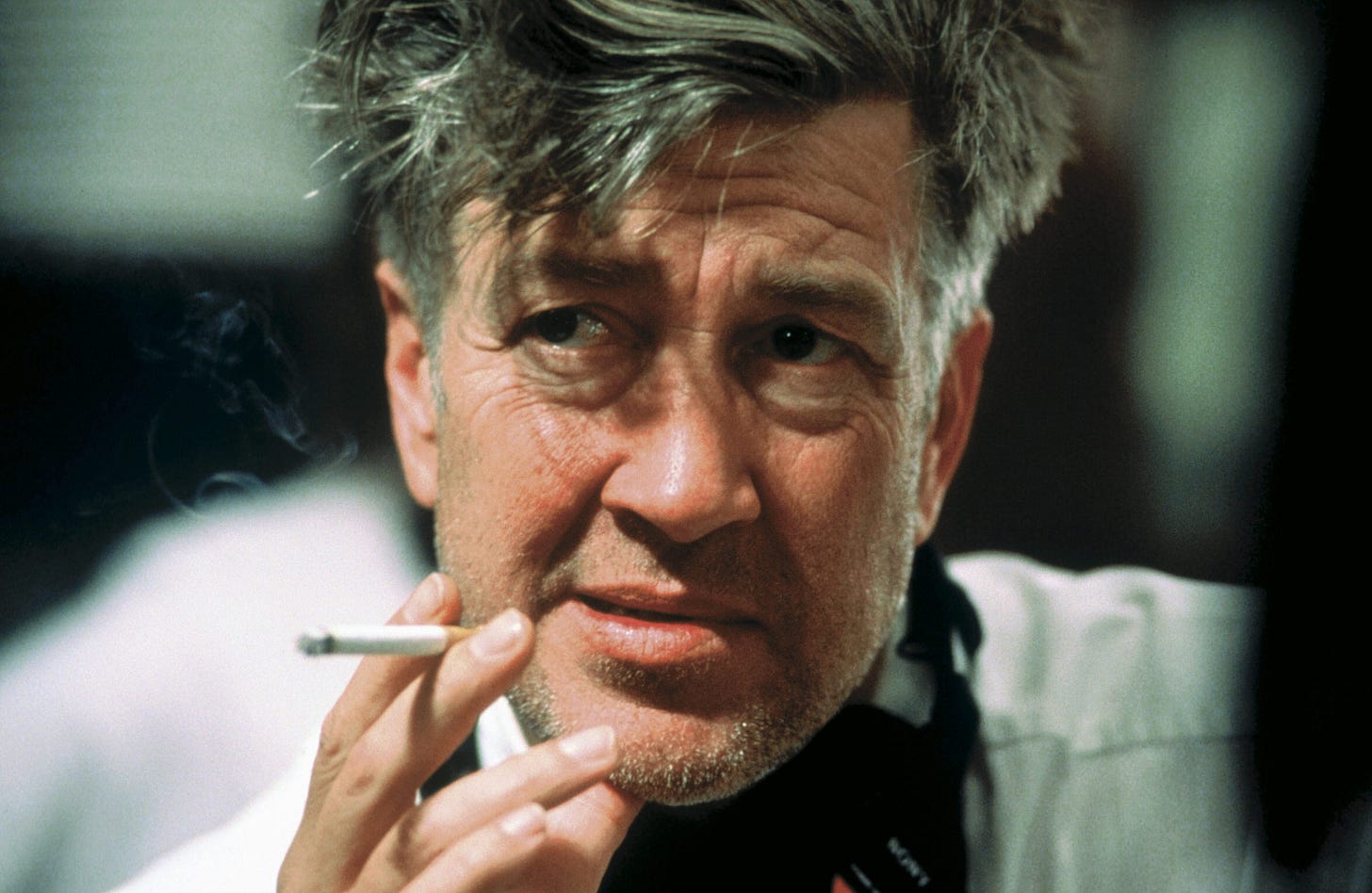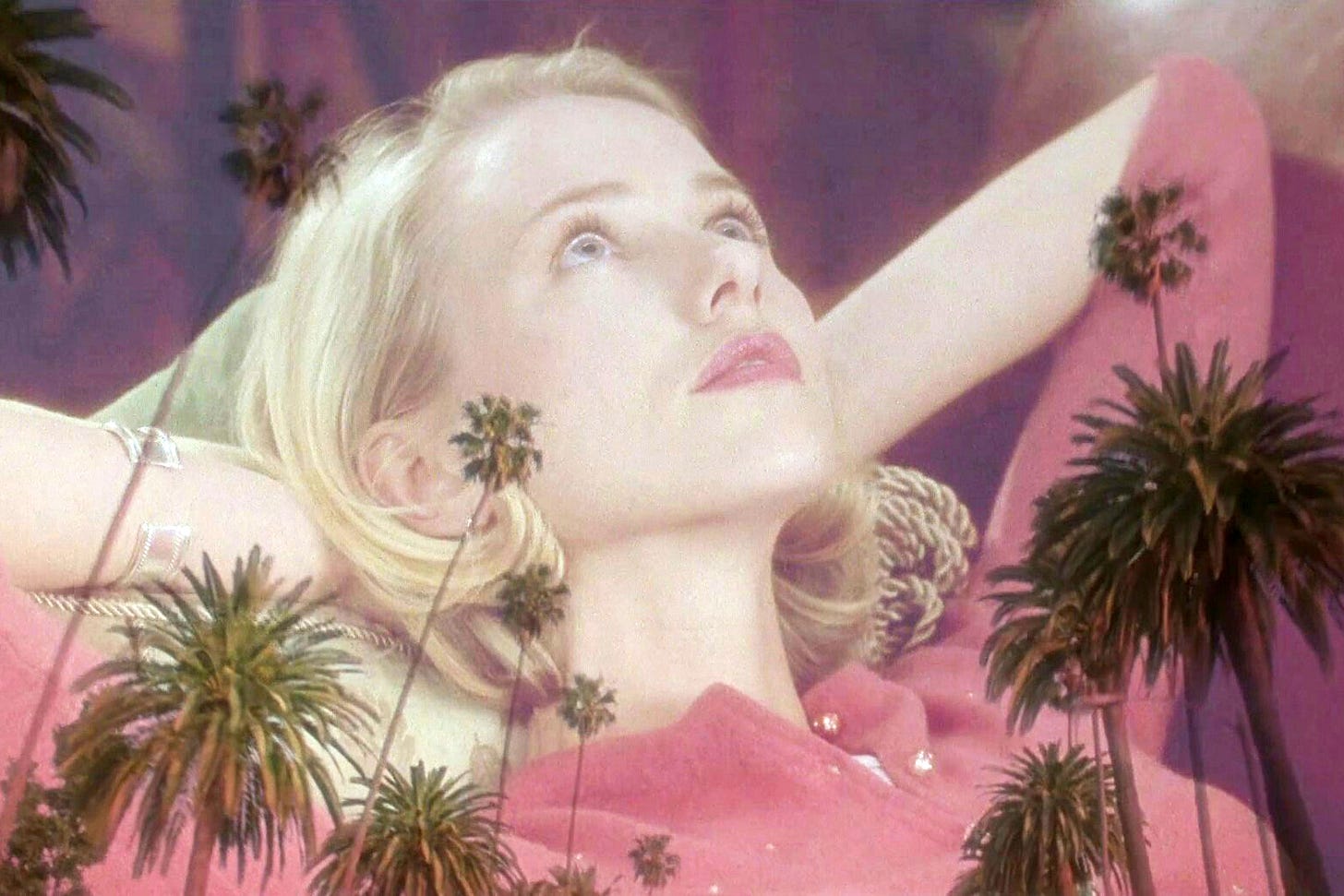This Whole World is Wild at Heart and Weird on Top
on David Lynch (1946-2025), and also, inevitably, on myself
I’ve started and stopped this piece multiple times. I don’t know how long this will end up being, but when you have something to say, you’ve gotta let it out.
One week ago today, David Lynch died at the age of 78; his 79th birthday came and went on Monday.
To say that Lynch’s work is important to me would be a dramatic understatement; as an artist, his work has been a guiding light. It would not be wrong to say that Mulholland Drive (2001) is my favorite film of all time––when I first lived in my own apartment in Los Angeles, already almost fifteen years ago, I’d watch the DVD over and over, by myself on the couch, using its knotty structure and dramatic imagery as a road map to a city that was always near and newly mine.
What David Lynch’s work taught me is that there are multiple ways to “make sense.” There is a literal way, and a figurative way. I’ve always been interested in the figurative way; I’ve always been interested in dream logic and un-reason. I’m drawn to the idea that surface-level sense is sometimes nonsensical; sometimes, you need to close your eyes and let it wash over you, and let the emotional sense do its work. Ultimately, all of Lynch’s works are Frank Capra movies; Kyle MacLachlan is a bizarro-world Jimmy Stewart. They all have heart, and meaning. They just don’t make a lot of “sense”.
This was a sea change in my relationship with art; I haven’t been moved by an observation like this until I read Paul Schrader’s Transcendental Style in Film, and began to understand cinema as a kind of sculpture-in-time. And that Capra-ness is something that Lynch’s artistic progeny largely forget––he’s not being weird for weird’s sake. He’s weird because the world is weird, and he sees the weirdness––but deep down, he’s still trying to just retell The Wizard of Oz.

I was born the year both Wild at Heart and the first season of Twin Peaks came out; he was on the cover of TIME Magazine (below) when I was exactly three months old. I came into a world, in many ways, being shaped and defined by David Lynch’s sensibilities. “Wicked Game” was on the radio. Laura Palmer was dead, wrapped in plastic. A year later, with the premiere of season 2 of Twin Peaks, he’d be a laughingstock, left for dead in the public eye, to scrounge enough resources together for three last movies and one triumphant final season of his television opus before being forced to go dark for nearly his entire last decade. The artistic world I’ve lived in, my whole life, whether I was aware of it or not, has been his.
The first thing I ever really wanted to do was make movies. I would shoot stop-motion shorts with action figures in elementary school; by high school, I was acting in school plays and writing screenplays. I moved to Los Angeles from the San Diego area when I was 18, and did extra work on TV sets, and I wrote. I wrote a whole feature, contracted on spec, which was sold in a packet to the SyFy Channel where it disappeared into the void. And still, I didn’t make a movie.
I moved to Portland, I finished college. I did comedy, culminating at co-hosting a show at SF Sketchfest a few weeks before COVID shut the world down. I played in bands. And yet––I didn’t make a movie.
I moved back to LA. I married my wife, who’d been by my side that whole time, a brilliant singer-songwriter, musician, and actress herself. I had more experience in the industry, but quickly felt pretty burnt out by Hollywood. I tried working in politics a bit; that didn’t pan out. During the pandemic, I got my masters from USC and got a job teaching. All of has been good, but I didn’t make a movie.
I shot a short last March, which I wrote and directed. One thing or another delayed the post-production process; now, I’m back on it, and there’s footage missing. Key footage; difficult to reshoot. So instead I’m putting those UCB classes to work and I’m improvising. I’m writing around the issue, and the short is becoming even better than it was before. I have a timeline; it’ll be done in a few months. And I have a feature outlined, in development.
I still have my day job. I still write, both privately and publicly here. I listen to and play music, and will continue to write about music and film here. I would still like to serialize a novel, although the one I was prepping for here has been converted into a screenplay instead. I want to create. I want to live the art life. I’ve wanted this my whole life, and it took my entire twenties to shed everything else that was in the way.
I turn 35 this July. I feel old. I know that I’m not, but I feel it. I feel pressed for time; if I’m going to release my first non-student short film when I’m 35 years old, I’ll really need to make up for lost time. This is not the truth; it’s a feeling. It’s a product of Hollywood mythology; I’m more of a pretentious European indie arthouse kind of guy anyway, and Europe tends to view the filmmaker as something more like a novelist, a serious, thoughtful artist, who should have something to say, as opposed to the Hollywood view of filmmaker-as-rock-star, a piss-and-vinegar fueled wunderkind in the Tarantino/Paul Thomas Anderson mold. No one blinks an eye at a first published short story by a 35 year old, a first novel by a 40 year old. But Hollywood expects everyone to be a rock star, or they’re worthless. Well––what’s Hollywood done for us lately?
To feel something so deeply that you know is not true––this is a facet of the absurd condition that David Lynch’s work explores. In that gap, in that tension, between the felt and the real, there’s explosively fertile work to be done. Joseph Merrick in The Elephant Man knows that he’s a human being of value––but does he feel it? Dale Cooper navigates the entire Laura Palmer case by jettisoning objective knowledge all together––pure instinct, pure intuition, pure feeling. The goal is not to abrogate your feelings to objective reality; I suspect that human consciousness, as expansive as it can become through practice, does not have the physical capacity to fully understand objective reality. So you can’t use that as your guide. The goal is to train your intuition and your feelings to serve you. This is what art does for us; it helps train our intuition. That’s how it guides us.
I didn’t intend to make this so much about myself, but that’s what good art does. It creates a scaffold around the skyscraper of the self, it gives us a context to build ourselves and our world around. I don’t learn anything about David Lynch from his work; I learn about myself. What I think I learn about him is a projection of what I’m learning about myself. This phenomenon repeats over and over, in all forms of art, from Beatles songs to Magritte paintings to David Foster Wallace novels. What we think we learn about others, we are really learning about ourselves.
This essay is not structured; it’s stream-of-consciousness. I tried to structure it, and I failed, and that’s okay. It doesn’t have an intentional structure, but everything has a structure of a kind, and if you can’t find it intentionally then let it happen organically. Embrace emergent phenomena. Respect the idea. Build to the point, which is this:
David Lynch is gone. Those of us who are inspired by his work have no choice anymore but to go out there and do it. Catch the big fish.
So now: I’m making a movie. And when it’s done, I’m going to make another. And then I’ll make another, or maybe something else, or maybe I’ll retreat into the woods and meditate for thirty years, or maybe I’ll take to the sea, or maybe I’ll publish droll humorous short fiction, or maybe I’ll get some friends and together and take over a small island nation that I can form in my own image and rule as a benevolent god-king. It doesn’t matter what you do, really. It just matters that you do it. That’s the takeaway. To focus your energy on creation over destruction, on humanity above all else, to spend your life polishing mirrors in the hope that we can finally see something beautiful––that’s a life well-lived. That’s the art life.
Focus on the doughnut, not the hole.
Thanks for everything, David.







Cheers to “the art life”:)! 🎨🖌️📝🎼Can’t wait to see the movie:)🎥🎞️🎬